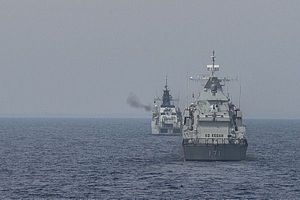On Tuesday, local media outlets reported that Indonesia, Malaysia, and the Philippines had reached agreement on limited, coordinated trilateral patrols in the Sulu Sea following a meeting in Bali, paving the way for a slow start to the much-anticipated initiative.
As I have written previously, the Sulu Sea – or, more specifically, the one million square kilometer tri-border area in the Sulu-Sulawesi Seas between the southern Philippines, Indonesia, and Malaysia – has long been a hub for transnational organized crime and terrorist threats (See: “Confronting Threats in the Sulu-Sulawesi Seas: Opportunities and Challenges”). The three Southeast Asian states had agreed earlier this year to undertake trilateral patrols in the Sulu-Sulawesi Seas following a recent spate of kidnappings involving Malaysian and Indonesian nationals by the Abu Sayyaf Group, which is based in the southern Philippines.
From August 1-2, the defense ministers from the three countries met in Bali for the latest in a series of meetings that began in Vientiane on the sidelines of the 10th ASEAN Defense Ministers’ Meeting in May. The ministers discussed how to operationalize the “Framework on Trilateral Cooperative Agreement between Malaysia, Indonesia and the Philippines” on the Sulu Sea Patrol Initiative (SSPI), which had been agreed upon during an earlier meeting on July 14 (See: “New Sulu Sea Trilateral Patrols Pact Nears Completion“). They agreed on the initial shape of the patrols as well as several more specific points on areas such as standard operating procedures, communications, and intelligence-sharing.
Indonesian defense minister Ryamizard Ryacudu told The Jakarta Post that, at least for now, the three countries have agreed to implement coordinated patrols, rather than joint patrols. As I have mentioned before, the distinction between coordinated and joint patrols is significant – the term “joint patrols” implies that they would be carried out in unison and across national borders, while the more modest notion of “coordinated patrols” means that each state would conduct its own patrols within its own borders in concert with others.
The three countries also agreed that military personnel would be allowed to cross borders to pursue kidnappers or terrorists – or during instances of “hot pursuit.” However, the terms governing these “hot pursuits” are quite strict – they are only allowed in emergency situations and must be done with prior knowledge of the infringed party. In addition, for now, they only extend to the maritime domain and do not cover land-based operations, even though the countries did agree to explore that in the future.
There was also reportedly agreement on the establishment of three command posts to facilitate coordination and intelligence-sharing: Bongao in the Philippines, Tawau in Malaysia, and Tarakan in Indonesia. The Post noted that designated sea routes and air surveillance were also discussed, even though no details were publicly disclosed. The fact that those discussions are being held, however, is promising. As I indicated in a previous piece, air surveillance is part of a string of activities that constitute the supporting infrastructure for such patrols, as was the case during the Malacca Strait Patrols (MSP).
The Post also noted other provisions that were agreed upon, including the fact that each ship crossing the Sulu-Sulawesi Seas would have to have at least three sea marshals (on the Indonesian side, provided by the Indonesian military or TNI with the coordinated patrol itself implemented by the Indonesian Navy’s Sea Battle Task Force, Guspurla). The three countries also agreed on joint naval exercises and the implementation of an automatic identification system.






























